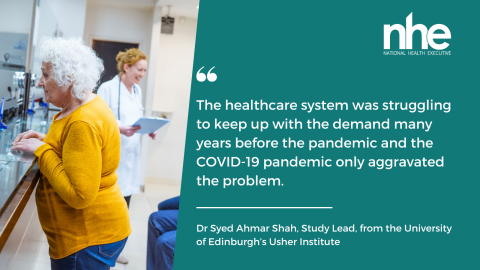Even if capacity increased by 30% compared to pre-pandemic levels, the excess pandemic backlog will not be cleared before the end of 2025, according to new research from the University of Edinburgh.
Research findings – published in the Lancet – suggest that the NHS must treat at least 10% more non-emergency hospital cases a month to start scaling back pandemic-induced waiting lists.
The University of Edinburgh’s research, which was conducted in collaboration with the University of Strathclyde, sought to understand the extent to which the pandemic impacted backlog.
Researchers analysed the number of referrals waiting for treatment per month between January 2012 and October 2022 and found the waiting list increased from 2.4 million at the start of 2012 to 4.6 million by February 2020. It increased by around 275,000 a year.
In October 2022, there were over 7.2 million referrals waiting for treatment – an estimated 1.8 million more than if the pandemic had not hit, according to the University of Edinburgh.

This is still likely to substantially underestimate the extent of true backlog, as a result of the large numbers of people who have not presented to the NHS following Covid-19.
The researchers say there were approximately 10.2 million missing referrals from the start of the pandemic to the end of October 2022.
To understand how differing numbers of people coming forward for treatment would impact the NHS, the study simulated a range of scenarios – this included between 25% and 75% of missing patients actively seeking treatment.
The study concluded: “Assuming a linear capacity increase in terms of completed pathways during three years (November, 2022, to October, 2025), the system capacity should be increased by more than 10% to reverse the increasing trend in waiting lists. Even with a 30% increase in system capacity, several years would be needed to clear the backlog.”
Dr Syed Ahmar Shah, study lead from the University of Edinburgh, said: “Moving ahead, it is evident that we cannot afford to leave our healthcare systems strained; instead, we must enhance their resilience to ensure better preparedness for any future emergencies.”
Image credit: iStock



















